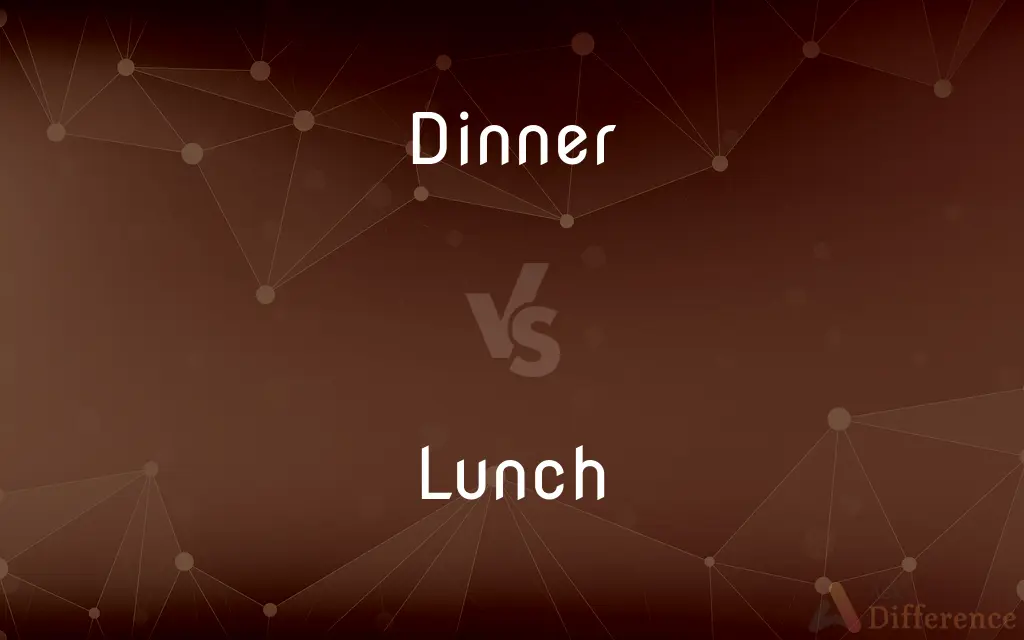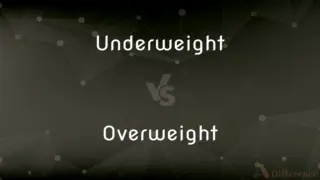Dinner vs. Lunch — What's the Difference?
Edited by Tayyaba Rehman — By Fiza Rafique — Updated on October 31, 2023
"Dinner" refers to the main meal of the day, traditionally served in the evening, while "Lunch" is a meal typically eaten in the middle of the day.

Difference Between Dinner and Lunch
Table of Contents
ADVERTISEMENT
Key Differences
"Dinner" and "Lunch" are both meals, yet they differ in timing and often in significance and size. Dinner traditionally denotes the main meal of the day, typically consumed during the evening. On the other hand, Lunch typically represents the meal eaten around midday.
Dinner gatherings tend to be more formal, often bringing together families or friends after a day's work. It's not uncommon for Dinner to be a larger, more elaborate meal. In contrast, Lunch, positioned in the middle of most people's working or schooling day, is often more casual and might even be hurried or on-the-go for some.
In various cultures and traditions, the significance of Dinner and Lunch might change. Some may have Dinner as their largest meal, while others could place more emphasis on Lunch. However, in many western cultures, Dinner is usually the meal where families gather and is often more substantial.
While the terms denote specific meals, they can also be fluid. In some parts of the U.S., for instance, "Dinner" might be used to describe a large midday meal on Sundays, while the evening meal is called "supper". Conversely, Lunch is consistently midday but can range from a quick sandwich to a prolonged, multi-course affair in some cultures.
The importance of these meals also varies depending on one's lifestyle. For a nine-to-five worker, Lunch might be a break from work, while Dinner signals the end of the day. For a student, however, Lunch could be a brief interval between classes, and Dinner a more leisurely meal with roommates or family.
ADVERTISEMENT
Comparison Chart
Typical Time
Evening
Midday
Formality
Often more formal, especially in gatherings.
Typically more casual.
Size & Significance
Generally considered the main meal in many cultures.
Might be lighter or on-the-go.
Cultural Variations
In some regions, can refer to a large midday meal.
Consistently refers to a midday meal.
Social Context
Often a gathering meal for families or friends post work or daily activities.
Common during work or school breaks.
Compare with Definitions
Dinner
A formal evening meal.
The organization hosted a Dinner in honor of the visiting dignitaries.
Lunch
A midday meal of any size or significance.
We had a business Lunch at the downtown restaurant.
Dinner
The main meal of the day, traditionally eaten in the evening.
We had roast chicken for Dinner last night.
Lunch
The food prepared for a midday meal.
I packed my Lunch in a reusable container.
Dinner
The food prepared for a main evening meal.
Dinner is in the oven and will be ready in an hour.
Lunch
A break period in the middle of the day for eating.
I read a book during my Lunch break.
Dinner
Dinner usually refers to what is in many Western cultures the largest and most formal meal of the day, which some Westerners eat in the evening. Historically, the largest meal used to be eaten around midday, and called dinner.
Lunch
An informal meeting or gathering around midday for a meal.
Let's catch up over Lunch next week.
Dinner
The chief meal of the day, eaten in the evening or at midday.
Lunch
Lunch, an abbreviation for luncheon, is a meal eaten around midday. During the 20th century, the meaning gradually narrowed to a meal eaten midday.
Dinner
A banquet or formal meal in honor of a person or event.
Lunch
A meal eaten at midday.
Dinner
The food prepared for either of these meals.
Lunch
The food provided for a midday meal.
Dinner
A full-course meal served at a fixed price; table d'hôte.
Lunch
To eat a midday meal.
Dinner
A midday meal in a context in which the evening meal is called supper or tea.
Lunch
A light meal usually eaten around midday, notably when not as main meal of the day.
Dinner
The main meal of the day, often eaten in the evening.
Lunch
(cricket) A break in play between the first and second sessions.
Dinner
An evening meal.
I had some friends to dinner two nights ago.
Lunch
Any small meal, especially one eaten at a social gathering.
After the funeral there was a lunch for those who didn't go to the cemetery.
Dinner
A meal given to an animal.
Give the dog its dinner.
Lunch
(intransitive) To eat lunch.
I like to lunch in Italian restaurants.
Dinner
A formal meal for many people eaten for a special occasion.
Lunch
(transitive) To treat to lunch.
Dinner
(uncountable) The food provided or consumed at any such meal.
Lunch
A luncheon; specifically, a light repast between breakfast and dinner, most commonly about noontime.
Dinner
(intransitive) To eat a dinner; to dine.
Lunch
To take luncheon.
Dinner
(transitive) To provide (someone) with a dinner; to dine.
Lunch
A midday meal
Dinner
The principal meal of the day, eaten in some countries about midday, but in others (especially in the U. S. and in large cities) at a later hour.
Lunch
Take the midday meal;
At what time are you lunching?
Dinner
An entertainment; a feast.
A grand political dinner.
Lunch
Provide a midday meal for;
She lunched us well
Dinner
The main meal of the day served in the evening or at midday;
Dinner will be at 8
On Sundays they had a large dinner when they returned from church
Lunch
A meal eaten in the middle of the day.
I had a sandwich for Lunch today.
Dinner
A party of people assembled to have dinner together;
Guests should never be late to a dinner party
Dinner
A meal in honor or celebration of something.
They threw a Dinner party for their anniversary.
Dinner
A particular style or manner of cooking a meal.
We're having a three-course Dinner tonight.
Common Curiosities
Can Dinner be eaten at midday?
In some regions or traditions, yes, "Dinner" might refer to a large midday meal, but generally, it's an evening meal.
Is Lunch always casual?
Not necessarily. Lunch can be a formal affair, especially in business settings or special occasions.
Is "supper" the same as Dinner?
In many places, "supper" and "Dinner" are used interchangeably, but in some contexts, "supper" might refer to a lighter, later meal.
Is a "working Lunch" a break?
A "working Lunch" typically involves discussing work matters while eating, so it's not a full break from work.
How long is a typical Lunch break?
It varies, but in many American workplaces, it's around an hour.
Can Dinner be a ceremonial event?
Yes, Dinner can be a ceremonial or celebratory event, like a gala dinner.
Are lunchboxes just for kids?
No, lunchboxes are for anyone wanting to pack a meal, whether kids or adults.
What does "out to Lunch" mean?
Besides the literal meaning, "out to Lunch" can informally mean someone is not paying attention or is clueless.
Is "Dinner time" the same worldwide?
No, Dinner time varies by culture and personal preference. Some countries dine late in the evening, while others eat earlier.
Can "Dinner" also be a verb?
Informally, yes. "To dinner" someone can mean to treat or invite them to dinner.
Why is Dinner often considered more formal?
Historically, Dinner was a time for families to gather after the day's activities, leading to its more formal association.
Is brunch related to Lunch?
Brunch is a meal between breakfast and Lunch, typically eaten in late morning.
Can the term "Dinner" refer to the size of a meal?
While "Dinner" often denotes the main meal, its definition isn't strictly about size.
Can you have "Dinner" foods for Lunch?
Absolutely! Meal names are more about timing than specific foods.
Can "Lunch" also be used as a verb?
Yes, "to lunch" means to have or take the midday meal.
Share Your Discovery

Previous Comparison
Underweight vs. Overweight
Next Comparison
Assignee vs. AssignAuthor Spotlight
Written by
Fiza RafiqueFiza Rafique is a skilled content writer at AskDifference.com, where she meticulously refines and enhances written pieces. Drawing from her vast editorial expertise, Fiza ensures clarity, accuracy, and precision in every article. Passionate about language, she continually seeks to elevate the quality of content for readers worldwide.
Edited by
Tayyaba RehmanTayyaba Rehman is a distinguished writer, currently serving as a primary contributor to askdifference.com. As a researcher in semantics and etymology, Tayyaba's passion for the complexity of languages and their distinctions has found a perfect home on the platform. Tayyaba delves into the intricacies of language, distinguishing between commonly confused words and phrases, thereby providing clarity for readers worldwide.
















































